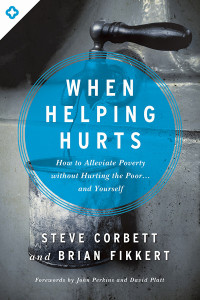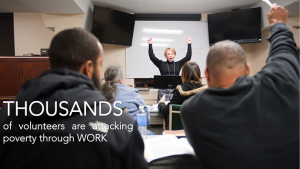Christians are called to help those in need, and our readings in Acts reveal that a distinctive feature of the church was that “no one had nee d” because brothers and sisters sacrificed their own possessions. This radical giving is truly a witness to God’s love and compassion poured out into hearts through the Holy Spirit. No Christian can deny that we are called to help the poor, but there is often some wrestling with the best ways to go about doing that. Recently I’ve been working through a book with an intriguing title: “When Helping Hurts: How to alleviate poverty without hurting the poor…and yourself.” In it the authors contend that Christians often unintentionally do harm to the poor by the ways we going about “helping.”
d” because brothers and sisters sacrificed their own possessions. This radical giving is truly a witness to God’s love and compassion poured out into hearts through the Holy Spirit. No Christian can deny that we are called to help the poor, but there is often some wrestling with the best ways to go about doing that. Recently I’ve been working through a book with an intriguing title: “When Helping Hurts: How to alleviate poverty without hurting the poor…and yourself.” In it the authors contend that Christians often unintentionally do harm to the poor by the ways we going about “helping.”
First of all, we often harm because we only think of poverty as a lack of material possessions, when in fact there are several other layers to poverty. By focusing on a lack of material things we run the risk of focusing exclusively on getting people more “stuff” when what they really need is to be restored to a right relationship wi th God, the self, others, and rest of creation. On top of that, the ways that we often help the poor with material issues may just help continue the cycle of poverty. The book is filled with lots of practical suggestions for how to help in ways that are truly redemptive (such as the Jobs for Life ministry pictured here).
th God, the self, others, and rest of creation. On top of that, the ways that we often help the poor with material issues may just help continue the cycle of poverty. The book is filled with lots of practical suggestions for how to help in ways that are truly redemptive (such as the Jobs for Life ministry pictured here).
The second way that we actually harm when trying to help is to perpetuate in ourselves a sense of superiority over the poor. The authors call this the “God complex”. When we give handouts to “fix” the problem of poor people, we swell up with pride about our generosity and also we get this impression that we are superior because we have material abundance, without realizing that we too are poor in non-material ways. This hurts us because it may lead us to avoid dealing with our own forms of poverty.
A fundamental point throughout the book is that true helping – not just quick ineffective fixes that bolster our egos – is costly and time consuming and redemptive, both for the materially poor and those who are helping.
I’m still working through the ramifications of the book and I can’t say I agree with every point in it, but it has led me to reflect on the idea of “harmful-helping” and how it applies to lots of areas of life. We may have good intentions but the actual way we help may have a negative effect. I think of the parent who constantly bails a child out of trouble and shields him from consequences. Or how about the person who is always giving a person a ride somewhere and unintentionally developing in him an unhealthy dependence on others. Or, what about the person who practices shuttle diplomacy between two friends in a dispute without actually prompting them to talk to each other about the problem. Or, how about the church member who always does the work and rarely steps aside to let others develop their skills or gifts. They all mean well and have hearts to help, but at the end of the day may be harming.
Take a few minutes today to reflect on some of the ways you have been trying to help. If we are honest, we will probably identify a few ways in which we’ve been doing more harm than good. If so, the answer is NOT to stop helping. Instead the answer is to prayerfully reflect on ways you can adjust your helping to ensure you are having a positive and redemptive impact on the person or situation. Blessings. DTW


I’m interested in learning more about the concept of being poor in areas other than the obvious lack of means. Panhandling has become so prolific in the past few years and I can’t help but wonder why. Yesterday, I saw an able bodied young man at the corner of Hawthorn and Market. His one word sign said “weed” . I thought, wow, that didn’t take long. He clearly doesn’t understand that the kind of people who are sympathetic to his plight, and might have been giving him money before, are not the kind of people driving around with marijuana in their car to pass out. It made me think…this guy is so lost he doesn’t even know what he needs and would probably refuse it, if it were laid at his feet. I also thought, I can’t possibly know where to start without getting to know him as a person. I reasoned the he probably isn’t interested getting to know anyone, he just wants weed. And frankly, it doesn’t feel like something I can do. I see him and a hundred others like him and look away because I can’t fix something that is that broken.
Some thoughtful comments Mike. The four kinds of poverty discussed in the book are…1) Spiritual Poverty (when our relationship with God is broken and strained) 2) Poverty of Being (when we either think too much of ourselves (“God-Complex”) or too little (low self esteem) 3) Poverty of Community (when we are self-centered and lack community and genuine concern for others) 4) Poverty of Stewardship (when we experience loss of purpose, we are lazy or workaholics. Material poverty is sometimes the result of a broken system (political, economic, social) that is outside someone’s individual control (lose your job because the price of oil drops dramatically) or the result of individual sinful behaviors (such as laziness or other choices, etc). It may also be a combination of things. One of the important points of the book is that to effectively help the poor we have to first spend some time diagnosing the real problem.